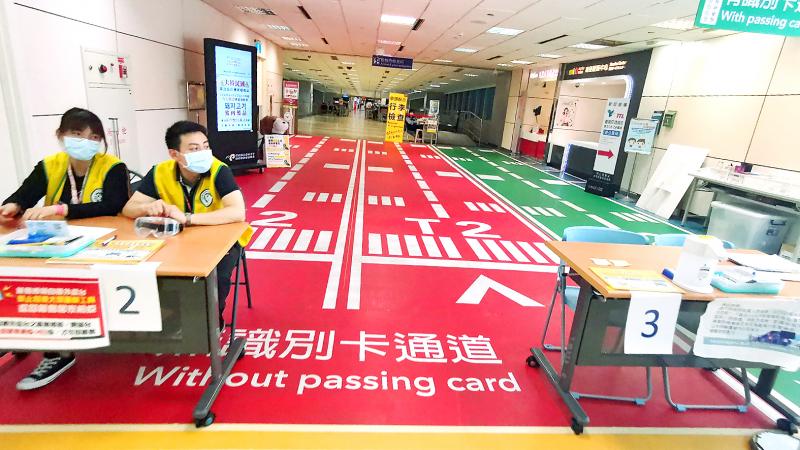An overwhelming majority of German companies operating in the nation consider travel restrictions between Taiwan and the EU harmful to their businesses, a survey by the global network of the German Chambers of Commerce Abroad found.
Among the surveys of the chambers’ 140 locations in 92 nations from June 15 to 26, the one in Taiwan found that 90.5 percent of respondents cited travel restrictions as the biggest burden on their operations, the German Trade Office Taipei said on Monday.
Seventy percent of respondents perceived the ban as a major challenge for Taiwan’s economic recovery, the office said in a press release.

Photo: Tony Yao, Taipei Times
“It was with great regret that we have learned about the decision of the European Union not to add Taiwan to the list of safe travel destinations,” German Trade Office Taipei Executive Director Axel Limberg said.
Limberg was referring to Taiwan’s exclusion from the list of nations exempted from the EU’s COVID-19 travel ban that started on Wednesday last week, which included Australia, Japan, New Zealand, South Korea and Thailand from the Asia-Pacific region.
That exclusion might have been due in part to a lack of reciprocity from Taiwan.
China provisionally made the list, but only on condition that Beijing reciprocally grant EU visitors the same right of entry.
Taiwan has barred the entry of most travelers from around the globe, including Europe, as the Central Epidemic Command Center still classifies the whole world under its highest alert level for COVID-19.
The trade office is lobbying the German government to include Taiwan on the list to facilitate bilateral business efforts, Limberg said, adding that lifting travel restrictions is essential for business development.
Given that the EU has started to slowly reopen its borders for business people and travelers, Limberg said that the two sides should “reach a compromise on mutually lifting their travel restrictions.”
In such a case, he was confident that “the right and mutually accepted balance between the protection of public health, the economy and the freedom of travel can be found, and both sides will benefit from it.”
The survey showed that 57.2 percent of German companies in Taiwan expect their revenue to decrease this year as a result of the COVID-19 pandemic.
Despite that, the survey found that German companies remain committed to Taiwan, with 85.7 percent saying that they do not intend to relocate their businesses, while 57.1 percent intend to stick to their investment plans.

Right-wing political scientist Laura Fernandez on Sunday won Costa Rica’s presidential election by a landslide, after promising to crack down on rising violence linked to the cocaine trade. Fernandez’s nearest rival, economist Alvaro Ramos, conceded defeat as results showed the ruling party far exceeding the threshold of 40 percent needed to avoid a runoff. With 94 percent of polling stations counted, the political heir of outgoing Costa Rican President Rodrigo Chaves had captured 48.3 percent of the vote compared with Ramos’ 33.4 percent, the Supreme Electoral Tribunal said. As soon as the first results were announced, members of Fernandez’s Sovereign People’s Party

MORE RESPONSIBILITY: Draftees would be expected to fight alongside professional soldiers, likely requiring the transformation of some training brigades into combat units The armed forces are to start incorporating new conscripts into combined arms brigades this year to enhance combat readiness, the Executive Yuan’s latest policy report said. The new policy would affect Taiwanese men entering the military for their compulsory service, which was extended to one year under reforms by then-president Tsai Ing-wen (蔡英文) in 2022. The conscripts would be trained to operate machine guns, uncrewed aerial vehicles, anti-tank guided missile launchers and Stinger air defense systems, the report said, adding that the basic training would be lengthened to eight weeks. After basic training, conscripts would be sorted into infantry battalions that would take

GROWING AMBITIONS: The scale and tempo of the operations show that the Strait has become the core theater for China to expand its security interests, the report said Chinese military aircraft incursions around Taiwan have surged nearly 15-fold over the past five years, according to a report released yesterday by the Democratic Progressive Party’s (DPP) Department of China Affairs. Sorties in the Taiwan Strait were previously irregular, totaling 380 in 2020, but have since evolved into routine operations, the report showed. “This demonstrates that the Taiwan Strait has become both the starting point and testing ground for Beijing’s expansionist ambitions,” it said. Driven by military expansionism, China is systematically pursuing actions aimed at altering the regional “status quo,” the department said, adding that Taiwan represents the most critical link in China’s

‘REALLY PROUD’: Nvidia would not be possible without Taiwan, Huang said, adding that TSMC would be increasing its capacity by 100 percent Nvidia Corp CEO Jensen Huang (黃仁勳) on Saturday praised and lightly cajoled his major Taiwanese suppliers to produce more to help power strong demand for artificial intelligence (AI), capping a visit to the country of his birth, where he has been mobbed by adoring fans at every step. Speaking at an impromptu press conference in the rain outside a Taipei restaurant, where he had hosted suppliers for a “trillion-dollar dinner,” named after the market capitalization of those firms attending, Huang said this would be another good year for business. “TSMC needs to work very hard this year because I need a lot